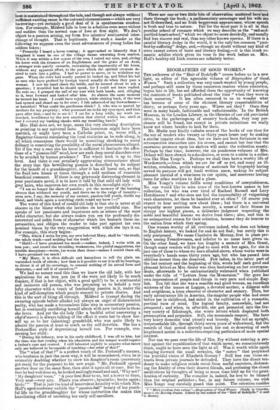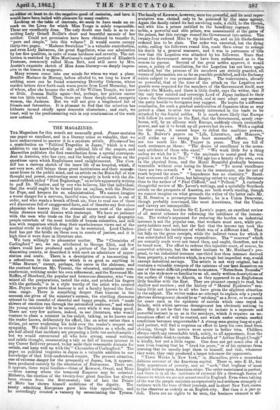BIOGRAPHIES OF GOOD WOMEN.* THE authoress of the " Heir
of Redclyffe " comes before us in a new light, as editor of this agreeable volume of Biographies of Good. Women." Such a collection was very much wanted by young people, and perhaps still more by those numerous readers whose education, begun late in life, has not afforded them the opportunity of knowing the contents of books published about the time "when they were in their nurseries." It has often occurred to us to wonder what. has become of some of the choicest literary respectabilities of thirty, or perhaps forty years ago. Where are they ? Once they were in many hands, fashionable and unfashionable. In the British Museum, in the London Library, in the libraries of our old provincial cities, in the gatherings-up of country book-clubs, they may per- chance still be found, but except in private collections we really know not where besides to look for them.
Mr. Afudie may kindly embalm some of the books of our time for the use of readers who twenty or thirty years hence may be making a similar inquiry about them, but we have not been fortunate in our retrospective researches into his stores, and cannot but fear that the enormous pressure upon his shelves will make the collection scanty. Perhaps by that time, however, the six ponderous volumes of Mrs. Delany will have shrunk to a duodecimo, or even to a niche in a collec- tion like Miss Yonge's. Perhaps we shall then have a worthy life of Wordsworth,—from which we are far off as yet, and many an ill- written, overladen, prolix volume of materials for biography having served its purpose will get itself written anew, making its subject pleasant instead of a weariness to our spirits, and moreover leaving room for other worthies to find a place. Miss Yonge's volume fulfils many conditions of aeoeptableness.
No one would like to miss some of the best-known names in her collection, for who was ever tired of Rachael Russell and Lucy Hutchinson? and who does net feel the impossibility of vulgarising such characters, let them be handled ever so often ? Of course you expect to hear nothing new about them ; but there is a universal sympathy more precious than novelty, a sense of their fitness to occupy our highest places, a deliberate judgment respecting the noble and beautiful lessons we derive from them ; also, and this is no unimportant reason for their selection, because they do honour to the nation from which they spring. One woman worthy of all reverence indeed, who does not belong to English history, we looked for and do not find; but surely this is only postponed_ We mean Charlotte de Mornay, first in place per- haps among Frenchwomen, and inferior to no name here given us. On the other hand, we have too lengthy a memoir of Mrs. Grant, though many readers will be glad to meet with her again, for she is just one of those to whom we have alluded above, whose works were in everybody's hands some thirty years •ago, but who has passed into oblivion sooner than she deserved. Few ladies, in the latter part of the last century and the beginning of this, wrote half such good and pleasant letters as Mrs. Grant was then bestowing on her correspon- dents, afterwards to be enthusiastically welcomed when published under the title of "Letters from the 'Mountains." She gave her own impressions of people and things in very pure and simple Eng- lish. You felt that she was a sensible and good woman, an excellent mistress of the manse at Laggan, a devoted mother, a dilis:ent wife and neighbour, a keen observer of character and scenery. Then, her early adventurous life in America, the singular people who had come before her in childhood, had aided in the cultivation of a romantic, poetical turn of mind. The logical faculty, meanwhile, had not prospered ; and when, in after-life, she got promoted into the lite- rary society of Edinburgh, she wrote letters which displayed both presumption and prejudice. Still, she commands respect. She bore very heavy domestic trial piously and bravely. She led an upright, irreproachable life, through thirty-seven years of widowhood, but the records of that period scarcely mark her out as deserving of such lengthened notice in a collection requiring particulars of more special interest.
Nor can we pass over the life of Mrs. Fry without entering a pro-
test against the republication of that which never, we conscientiously think, ought to have seen the light at all. Was it worth while again bringing forward the small scruples, the " motes " that perplexed the youthful vision of Elizabeth Gurney ? Still less can those ex- tracts from private journals be defended. They have the direct ten- dency to make religious minds recoil from useful exercises, distrust- ing the fidelity of even their dearest friends, and profaning the closet meditations by thoughts of being at sonic time held up for the grati- fication of curiosity. 'Ile compiler is, indeed, far less to be blamed than the original publisher; but, in any future volume, we wish Miss Yonge may carefully guard this point. The selection enables * "More prechna than rubies."—Biographies of Good Worsen. Chiefly by Contribu- tions to the Monthly Packet. Edited by the author of the "Heir of Redelyffe." J. and C. Healey.
an editor at least to do the negative good of omission, and here it would have been hailed with pleasure by many readers.
Looking at the table of contents, we seem to have made no re- mark on the Lives for which Miss Yonge is solely responsible. These are excellently done. The only doubt one feels is as to re- writing Lady Grisell Baillie's short and beautiful memoir of her mother. Could not permission have been obtained to transfer it, "pure and simple," into this volume? It would scarce occupy thirty-two pages. "Madame Swetchine " is a valuable contribution, and even Lady Balcarres, the great flagellator, wins our admiration by her fine qualities, in spite of some hardness and severity. The col- lection is enriched by Miss Martineau's capital portrait of Elizabeth Freeman, commonly called Mum Bett, and still more by Mrs. Austin's exquisite sketch of Miss Anna Gurney—so deeply impres- sive in the lesson it sugy2ests.
Many women come into our minds for whom we want a place. Besides Madame de Mornay, before alluded to, we long to know if nothing more can be found concerning Dorothy Osborne, whose maiden letters drew forth such warm praise from Lord Macaulay, but of whom, after she became the wife of Sir William Temple, we know so little. Joanna Baillie again—but, perhaps, her private career was too little varied. Then, the-re are those deeply-tried, energetic women, the Judsons. But we will not give a lengthened list of friends and favourites. It is pleasant to find that the selection has hitherto turned chiefly upon domestic characters ; and such, we trust, will be the predominating rule in any continuation of the work now noticed.































 Previous page
Previous page